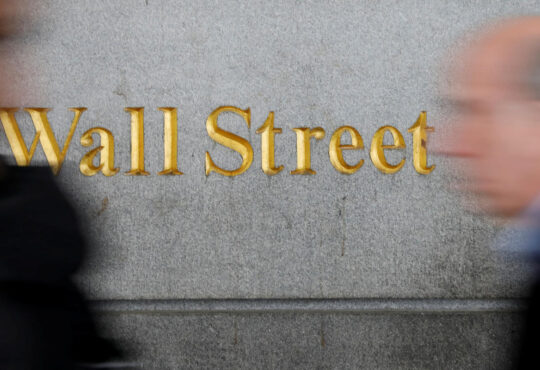
The annus horribilis for City fund managers
Last year is widely regarded as one of the worst years for investment returns. The classic 60/40 portfolio in which 60% is invested in stocks and 40% in bonds, recorded its worst year since 1937. Active fund managers generally had a poor year particularly in Europe where S&P Global recently found just 11% outperformed over the last year (US funds did much better).
With much of the world’s asset management industry located in London, SCM Direct decided to analyse the main share class of the Investment Management (IA) denominated UK based retail funds, comparing their performance against their benchmark. A huge data exercise – though not compared to the size of Matt Hancock’s WhatsApp messages it would appear.
More fed rate hikes could be on the cards after another strong US jobs report
The US job market still isn’t showing many signs of slowing, as the country added another 311,000 jobs in February.
While the total was down from January’s surprising 517,000, it was still ahead of expectations.
The news may encourage the Federal Reserve to raise interest rates higher again.
“Investors will interpret today’s strong jobs report as a sign that the Fed is likely to continue to tighten monetary policy in the months ahead,” Richard Flynn, managing director at Charles Schwab UK, said. “Over the past year, the Fed has been raising interest rates in order to control inflation.
“Yet this strategy risks reducing demand substantially, creating both a weaker growth rate and weaker labour market. To some extent, officials want to see this weakening occur. Until jobs reports reflect reduced demand within the economy, officials are likely to decide that the inflation rate is running hot and needs to be cooled further.”
Baby food maker Ella’s Kitchen cooks up 18% revenue rise
Ella’s Kitchen has boosted its market share in the baby food sector and notched up sales growth despite challenging conditions, newly filed accounts show.
The company makes organic meals for infants such as lamb tagine and cottage pie, as well as puddings.
Chief executive Mark Cuddigan said: “Against the backdrop of economic uncertainty, the Ella’s Kitchen team has once again delivered a set of outstanding results.”
Construction work slips to 11-month low despite wider GDP growth
The construction sector had its worst month in almost a year, as “economic uncertainty” and bad weather led to the biggest drop in new projects since the covid-19 pandemic hit.
The decline came despite GDP figures showing the UK economy as a whole grew by a better-than-expected 0.3% in January, and comes days after a survey revealed contractors were struggling to fill 2023 order books.
Construction output dropped by 1.7% in January, its biggest decline since June, while the total value of building work came to £14.84 billion, the lowest since February 2022.
New project output fell by 4%, the sharpest decrease since Covid-19 put work on hold in March 2020, with new infrastructure especially hard-hit.
London mortgage holders more exposed as FCA calls on lenders to provide support
The main City watchdog called today for mortgage lenders to do more to help struggling borrowers as it warned that hundreds of thousands of households were on the brink of financial difficulty, with stretched finances more likely in London and the south east.
The Financial Conduct Authority said over 350,000 more mortgage holders could face difficulties in keeping up with payments by the end of June as it issued new data on the UK mortgage market. That is in addition to the 200,000 people already in “payment shortfall”.
With house prices higher in the capital and the surrounding areas, Londoners are more likely to have to reduce spending or use savings to meet their mortgage commitments. Borrowers aged between 18 and 34 are also probably more exposed.
The FCA said it “expects firms to support borrowers in financial difficulty,” and has guidance om measure including “extending the term of their mortgage or making reduced monthly payments for a temporary period.”
Lenders supported over 2 million customers over the last year, via budgeting tools, access to debt advice, and tailored mortgage forbearance.
City Comment
The week started with moans that London is losing out on the latest tech boom. That its financial markets are dowdy and unappealing.
By today, investors were calling for a government bailout of at least one US tech giant — the Silicon Valley Bank— in order to prevent another banking crisis.
Inbetween, supposed tech darling WANdisco went from hero to zero in about 24 hours.
When it said it would seek a US stock market listing this was seen as yet another sign of London losing to New York. Then it revealed it had uncovered “significant, sophisticated and potentially fraudulent irregularities” that puts its entire future in doubt.
New York is welcome to it.
Over in Silicon Valley, a place we’re supposed to be jealously in awe of, Silicon Valley Bank shares plunged 60% as investors suddenly decided to withdraw money.
In fear and panic, America’s top banks including JP Morgan, the world’s biggest lender, lost $50 billion in market value.
That’s what we’re supposed to be copying by loosening our regulations?
Every time the City chases the latest fad two things happen. First, it doesn’t work. Second, that it didn’t work turns out to be a great relief.
London’s stricter rules for firms listing on the stock market are a good thing, a strength. We have them for a reason and they mostly serve us well. It would be better if London saw itself as a club with strong entry requirements rather than a cold caller trying to sell timeshares to reluctant investors.
The City has been the leading centre of finance for centuries. Others will come and go.
Transport giant FirstGroup on track to beat profit guidance
South Western Rail, GWR and Avanti owner FirstGroup expects to beat its profit guidance for 2022-23, thanks mostly to an increase in bus passengers.
The transport giant said that First Bus passenger volumes have increased to 83% of 2020 equivalent levels, partially resulted from the £2 bus fare cap scheme introduced in England in January 2023.
As a result, the group said its profit for the year will now beat previous expectations of £137.4 million.
“I am pleased by the Group’s progress in the second half of our 2023 financial year, which has been driven by increased passenger volumes and improved operational performance in bus and stronger than anticipated demand for our open access operations in rail,” CEO Graham Sutherland said.
CMA ramps up Google probe by combining two investigations into one
The UK competition watchdog has ramped up its probe into Google by combining two separate investigations over alleged anticompetitive practices into one.
A probe into whether Google might have abused a dominant position through its conduct in advertising tech, launched in May last year, is to be merged into another into its practices in header bidding — the process of auctioning on advertising exchanges.
In a statement the CMA said: “Due to the interrelationship of the facts and conduct in the 2 investigations, the CMA has taken the decision to combine them.”
Banking stocks reel as FTSE 100 slides 2%
London banking stocks have fallen by as much as 5% and the FTSE 100 index is down 2% after tech lender Silicon Valley Bank sparked heavy selling on Wall Street last night.
The S&P 500 banking index slumped 6.6% and the top four US lenders together lost more than $50 billion as the California-based bank highlighted the strain from continued higher interest rates and elevated levels of cash burn among its customers.
It sold down securities to meet withdrawals and launched a $2.25 billion stock and convertible bond offering to shore up its balance sheet, moves that prompted a 60% slide for its shares last night.
The developments caused a similar flight from risk in the UK, with HSBC and Barclays the biggest casualties as their shares slumped 5% – off 32.4p to 588.7p and 8.1p to 155.4p.
UBS Global Wealth Management said the events reinforced its cautious stance on US financials due to concerns over funding costs. However it does not see it as a systematic issue, with no stress evident in interbank funding markets.
UBS added: “The knee-jerk reaction in the market to this risk event looks overdone, in our view. But rising costs of deposits and possible deposit withdrawals are likely to pressure sector earnings.”
Other stocks sharply lower today included Lloyds Banking Group with a fall of 1.8p to 49.65p, while Prudential gave up 4% or 53.5p to 1226p. Only five defensive-focused stocks made the risers board as the FTSE 100 index retreated 150.43 points to 7729.55.
The FTSE 250 index also tumbled 2%, down 387.63 points to 19,305.27, led by tech investor Molten Ventures as the Cazoo and Trustpilot backer slumped 12% or 45p to 322p.
FirstGroup shares bucked the trend, rising 1.8p to 107.9p, after lifting profits guidance on the back of a strong recovery in bus passenger numbers.
BP boss awarded £10m pay deal
Further signs emerged today of big oil bosses cashing in on the surge in energy prices after the CEO of BP was awarded over £10 million in pay.
Bernard Looney’s remuneration is 172 times the median pay at the company, its annual report showed. It comprised a salary of £1.4 million, a short-term bonus of £2.4 million and a long-term award of £6 million.
Looney, who has been CEO since July 2020, has racked up 8.7 million shares, options and share interests since taking on the job, which are worth a combined £47.7 million at today’s prices if they are all awarded in due course.
It comes just a day after Shell came under fire after it revealed its outgoing CEO Ben van Beurden was in line for a payout of up to £21 million.
BP said the bonus “is based on performance against annual measures and targets set at the start of the year” and reflects “the unique characteristics of the energy sector”.






